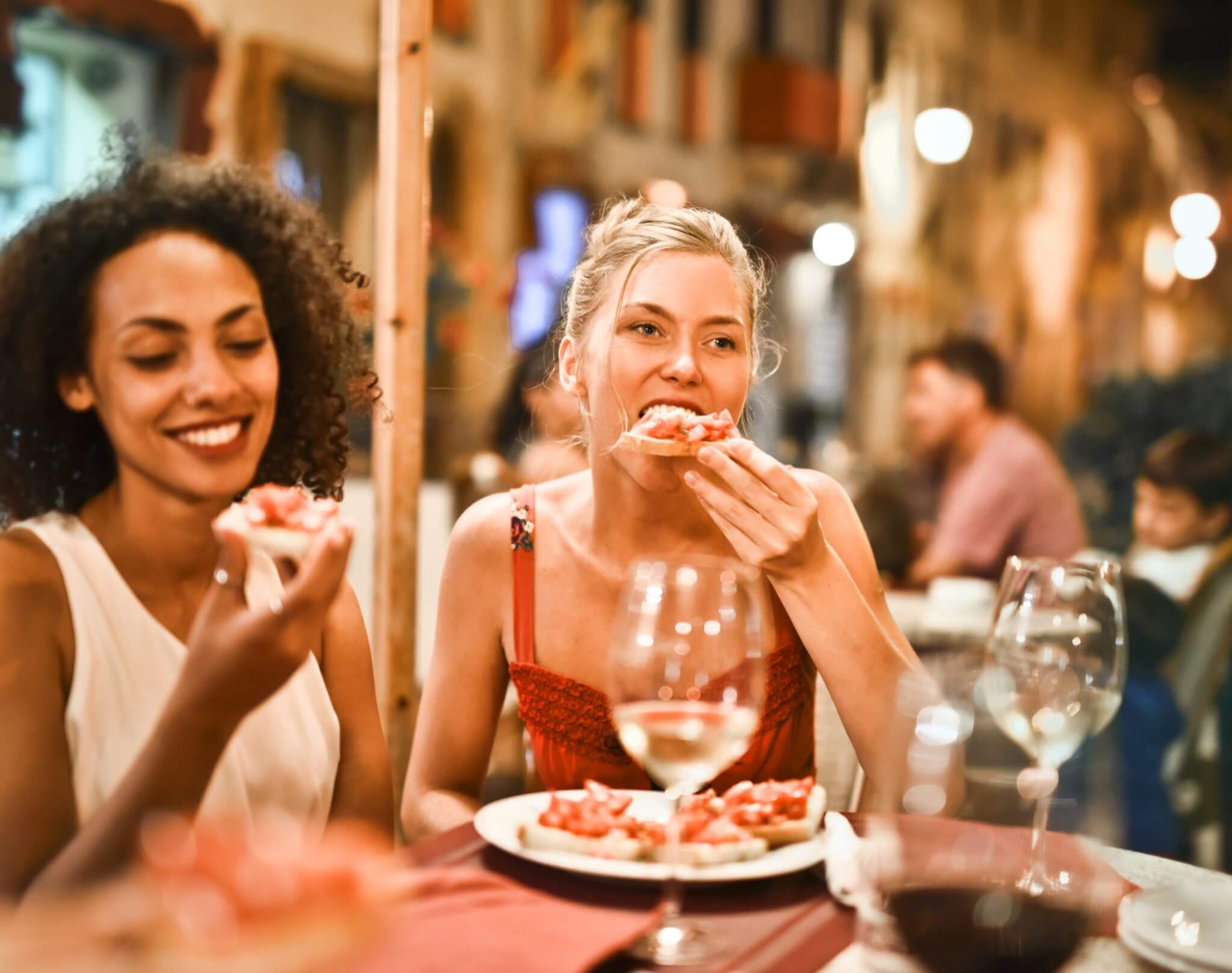11 Tips for Sustainable Wellness & Weight Loss

Why is it so easy to regain weight after dieting?
Messages about how to lose weight in media and popular culture often promote the latest fad diet or product. For some reason, we flock to these diets like lemmings. If you only eat these particular foods and nothing else, the propaganda proclaims, you will magically transform into a bikini model reclining on the deck of a sailboat in Fiji. Sadly, traditional dieting and “diet food” has rarely made good on this promise, or at least not for very long. On the other hand, evidence-based research tells us another compelling story. This time there’s real hope about sustainable weight loss, and thankfully it’s all about nourishing rather than starving yourself.
Recent studies show that when people restrict food to lose weight, the cards are stacked against them. Not only does your body revert to a slower metabolism after this type of weight loss, it also produces less leptin; a hormone that regulates hunger. Adding insult to injury, your body needs fewer calories than it used to just to function. Additionally, you may feel less self-control around food when you finally get your hands on some. All these results of dieting add up to easy weight gain, not to mention several helpings of stress.
If you want to lose or maintain weight, try following these 11 simple guidelines to help you shift your thinking about food. Learn how to avoid the pitfalls of diet culture, and embrace a healthier relationship with food that will serve you better. These lifestyle modifications will allow you to reach and keep a weight that you are comfortable with.

1. Trust your gut: eat regular meals instead of depriving yourself.
Research shows that achieving a healthy, sustainable weight begins with eating healthy food on a regular basis. According to Harvard Medical School, “Our bodies are also programmed to sense a lack of food as starvation. In response, our [basal metabolic rate] (BMR) slows down, which means fewer calories burned over time.” This means that the outcome of dieting will likely achieve just the opposite of what most people intend.
Additionally, food restriction and deprivation can feel exhausting and take all the joy out of an activity that is best experienced as a celebration of life. When you adhere to these strict regimens, you quickly find yourself in a toxic relationship with food.

2. Ditch diet culture.
Why has the simple human activity of eating become so wrought with anxiety for so many people? While there may be many reasons for this, one of them stems from the false ideals of diet culture. There’s always a new fad diet that pledges weight loss if you eat no fat, or only fat, or grapefruit with birdseed but only when the moon is waxing gibbous, or just plain cabbage soup for every meal like my mother tried for what seemed like an eternity. And the list goes on and on.
While many diets may potentially yield short-term benefits, over time the weight tends to creep back on. It’s important to continually nourish yourself with nutrient-dense foods to maintain a robust metabolism.
3. Honor your hunger.
The monster of dieting likes to whisper lies in your ear: “If you eat when you’re hungry, you are a failure.” It tells you to ignore the sounds of your growling stomach and demands that you refuse that blueberry scone. Dieting is that mean babysitter that won’t let you order a root beer float or bungie jump in the mall. Your body knows better and rebels when it gets a chance.
On the other hand, if you listen to the cues that your hunger gives you, and respond intuitively, you’ll become more aware of your body’s true needs than if you ignore your hunger and then find yourself ravenous later. Pay attention to which foods give you long-lasting energy, as well as the ones that provide you with just a quick fix. These observations will help you trust your intuition when it comes to nourishment.
4. Consider food as an ally instead of an enemy.
When food takes on a forbidden quality in your mind, you may judge yourself after you eat. This may be especially so when you eat something “sinful” like maple-soaked waffles or fudge right from the pan. No purpose is served by the shame and guilt that you feel after eating. No one wins in this narrative, except maybe the diet industry.
The all-or-nothing mentality purported by diet culture fuels a dangerous game where food is the villain; an evil temptress trying to seduce and destroy you. But waffles aren’t evil. They are simply DNA, like yourself, that have finite stored energy and nutritional value ready to fuel your body. Food should be life-enhancing, not a vehicle for self-loathing.
5. Channel your inner epicurean.
Try to plan your meals in a relaxing environment, and do your best to avoid eating while standing up or in a rush, when possible. Unplug from TV and devices. Bring on the candles, flowers, and tablecloths if these things make your mealtime feel special. Pick some fresh daffodils in the yard, and put on some beautiful music. If possible, eat with people who you feel comfortable and safe with. Above all, tune in and breathe.
Focus your awareness on how your body feels after eating certain foods, and steer yourself towards food that makes you feel good. Slow down and savor each bite. Enjoy the smells and tastes as you eat. Respect how your food might have made its way to your plate.
All of these things can contribute to a better relationship with food, and help you eat the right amount for your body intuitively. If you are less stressed out at mealtime, you are less likely to overeat.
6. Toss self-judgment out the window.
Are you a wedge of cheese cake? Are you a box of caramels, or three-quarters of a cherry pie? No. You are a human being who is much more than your food choices. It’s important to let the food police in your own mind and those around you know that you have consciously chosen to live by a different set of rules. Let yourself indulge in the sublime wonder of food. To enjoy food is to live fully.
When you are unhappy with a food choice you’ve made, forgive yourself. It’s only a moment in time, and your whole life is ahead of you with millions of opportunities to eat healthy, delicious food. Would you tell a child she is worthless for eating too much chocolate cake or that she is a failure because she gained a few pounds? Of course not. Accept and love yourself. Ask those unhelpful food policemen to go away and leave you in peace. Let them know the old rules no longer apply to you.
7. Respect your satiety.
Diets have a way of disconnecting you from your intuitive impulses around food because they dictate when, what and how you eat. Your own instincts and desires are left out of the equation. If you approach food from a place of insatiable hunger after depriving yourself, your body will instinctively want to devour whatever it can. If you eat healthy food regularly, your body will more readily sense the cues that tell it when it is hungry or full, without succumbing to the feeling that you might lose control.
When you free yourself from the diet mentality, you know that you will be able to feed yourself again when you need food. This sense of freedom decreases your immediate temptation to overeat. As you get used to eating more intuitively, try jotting down observations about how your body feels at different levels of satiety. A practice like this may help you determine when it’s time to lay down your fork and sink back into your chair, refueled and satisfied.

8. Comfort yourself with things other than food.
When you use food to comfort yourself, it’s easy to overdo it. Try a different comfort like yoga, meditation, soccer, pottery, hiking, walking your dog, knitting, taking a bath, reading, forest bathing; anything that makes you feel better even if you overdo it.

9. Respect your body.
It’s not fair that our culture puts so much pressure on us to look a particular way. Though we know deep down that it is our differences that make us extraordinary, it’s not always easy to remember. The pressure to conform to cookie-cutter definitions of beauty can be strong.
It’s sometimes helpful to remember that the way we look has a lot to do with our genetic blueprint. In this light, why would we want to dishonor our ancestors by hating our bodies? Imagine if your great-grandmother hated her own body. You wouldn’t want her to do this, just as you wouldn’t want your great-granddaughter to hate hers someday. Be the person to break that cycle, and love your body for all that it does for you.
Try thinking of yourself as a child who you are mentoring. You wouldn’t tell her that she had to be a certain weight or look a certain way to be worthy and lovable. Embrace your uniqueness, and honor how amazing your body is in so many ways.

10. Exercise out of joy— not because of how many calories you burn.
Exercise gives you energy and makes you feel better. Suddenly it’s not fun anymore when it becomes all about how many calories you can burn. We're not hamsters on a treadmill. We’re people who deserve to feel good and move freely in the world. When exercise is not a chore, you will be more likely to do it again. Choose exercise that is fun. It will speed your metabolism while helping you to inhabit your body in a more joyful way.
11. Live your values.
You may not be healthy in every way, but it’s likely that you have reasons to be grateful for aspects of your health. For one thing, you are alive. This alone is a fantastic reality. Invite gratitude into your day. It can be anything big or small: your dog curled up at your feet, or a pair of soft socks. Gratitude helps you feel at home in your life and in your body. When you feel at home this way, you are likely to follow your natural cues of hunger and satiety.
Your personal values are far better reasons to pursue greater health and wellness than superficial reasons thrust upon you by diet culture. Step back to look at the reasons why health is important to you. When you reflect on this, you may better understand that no food, comment, or image can make or break your self-worth. Ultimately, you decide what lifestyle choices are most worthy of your loyalty. Believe it. You are a trustworthy pioneer of your own health and wellness.